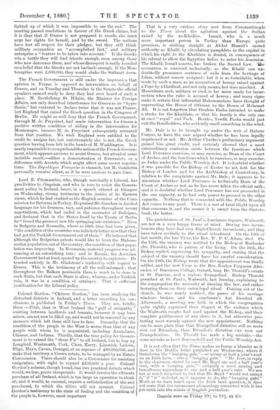The French Government is still under the impression that opinion
in France is opposed to intervention on behalf of Greece, and on Tuesday and. Thursday in the Senate the official speakers seemed ready to deny they had ever heard of such a place. M. Barthelemy St. Hilaire, the Minister for Foreign Affairs, not only described interference for Greece as an " hypo- thesis," but ventured to declare twice that it was not France, but England that raised the Greek question in the Congress of Berlin. He might as well deny that the French Government, through M. de. Freycinet, had made intervention for Greece a positive written condition of aiding in the intervention for Montenegro, because M. de Freycinet subsequently retreated from that position. We wish England were entitled to the credit he assigns her, but unfortunately she is not, the Greek question having been left in the hands of M. Waddington. It is nearly impossible to comprehendtbe action of the French Govern- ment, which appears anxious to assist Greece, but afraid of some invisible result,—either a demonstration of Extremists, or a difference with Austria which might affect some secret negotia- tions. The _Republique Pronfaiee is staunch, but M. Gambetta personally remains silent, as if he were anxious to gain time.






































 Previous page
Previous page